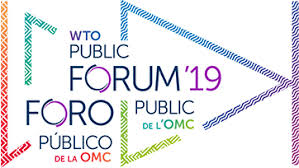The impacts of the industry 4.0 on the manufacturing sector and national states: An emerging perspective regarding digitalisation, mass customisation, and taxation
10 Oct 2019 02:00h
Event report
[Read more session reports from WTO Public Forum 2019]
The session was moderated by Mr Thomas Zanotto (Head Director, Department of Trade and Foreign Affairs, Federation of Industries of the State of Sao Paulo (FIESP)), who started by explaining that the advance of new technology is changing global trade. He considered that the WTO must remain the pillar of the trading system and further noted how Brazil is negotiating free trade agreements with many other countries. He added that Brazil is opening its national market to investors and other partners. Finally, Zanotto asked the panellists to give their perspectives on the consequences of industry 4.0 and digitalisation.
Mr Victor Do Prado (Director, Council and TNC Division, WTO) started by saying that digitalisation is changing global trade. He noted that changes are happening primarily in marketing and production. He added that we are entering the fourth industrial revolution, involving the Internet of Things (IoT), artificial intelligence (AI), and innovation. He recommended a book by Richard Baldwin, The Globotics Upheaval: Globalization, Robotics, and the Future of Work, to help us understand these issues. In addition, Do Prado said that we need frameworks and mentioned the WTO’s role on the e-commerce moratorium since 1998. He emphasised the Work Programme on E-commerce and its role in dealing with challenges to this topic on a multilateral level. He pointed out the challenges of taxation for digital trade, and concluded with suggestions concerning the ‘Joint Statement on Electronic Commerce’ and other issues discussed at the WTO, such as electronic signatures and e-payments.
Mr Alexandre Parola (Ambassador, Permanent Representative of Brazil to the WTO) started by explaining that industry 4.0 is increasingly important in international trade. He said that we need to understand current transformations of technology and production processes in digital trade: including changes in data collection and digital services. However, he said that some challenges remain in areas of employment, competition policy, automation, and ‘Uberisation’ of many sectors. According to Parola, Brazil has a new transformation agenda in dealing with the digital economy. He emphasised regional agreements, for example MERCOSUR, that guarantee market access and Brazil’s the partnership with other countries. He added that we still need reform to improve the economic framework of all WTO members, and that the WTO will provide the basis for that reform. In addition, he pointed out the importance of reforming agriculture. He highlighted that e-commerce is still a challenge, but also an opportunity for WTO members. He noted the issues of subsidies and said that we need to discuss direct investment further. Answering a question from the audience, he said that blocking WTO negotiations is not the solution for e-commerce rules.
Mr Lucas Ferraz (Secretariat, Foreign Trade of Brazil) discussed the new challenges of digitalisation for policy-making. He sketched a broad picture and said that fragmentation of production in his country is a serious issue, noting also that cross-border data flows are another concern. He explained how businesses put cross-border data flows to work and highlighted the ‘one-size-fits-all’ model of production in Brazil. Ferraz asked what role trade agreements play in the digital economy, and what the role of the WTO is in forming these agreements. He added that the most common provisions in e-commerce/digital trade are discussed on a national level. He said that although Brazil is one of the champions in start-ups of the digital economy, new challenges remain concerning the potential to close the productivity gap between developed and less developed economies. Furthermore, he said that challenges remain in the area of poor infrastructure and connectivity. He finally noted the importance of market openness; public procurement and investment facilitation; and provisions for services. He noted that industry 4.0 is already a reality in many countries. Answering a question from the audience, he said that Brazil still faces challenges regarding taxes on the digital trade, and that they are working on it.
Related topics
Related event

